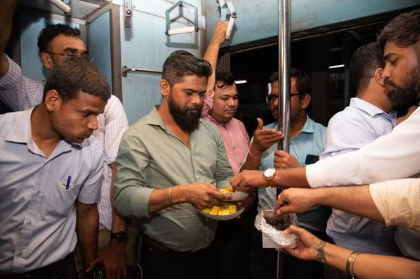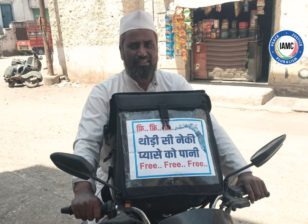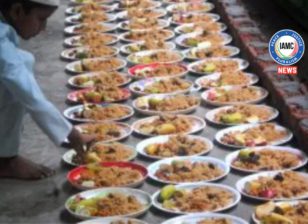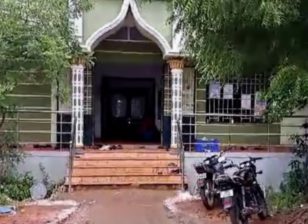Iftar aboard Flying Rani: Mumbai train showcases spirit of Hindu-Muslim harmony
As long-distance Muslim commuters break their Ramadan fast on crowded coaches, Hindu fellow-passengers make room and offer food
It’s 6.20pm on a humid evening in Mumbai and a crowd of harried commuters at Andheri station on the Western Railway line is desperate to get into packed local trains heading to the outer suburbs of the Indian metropolis.
As the Mumbai-Surat Flying Rani train draws up at the station, Ahmed Najeeb, a 54- year-old government schoolteacher, deftly hops on to the D1 coach where a large group of friends is waiting for him.
“Najeeb bhai [brother] is here,” the men alert each other, making a quick head count to see if everyone has arrived from their group of 20 “train friends” — a concept typical among Mumbai commuters who travel long distances together.
The group comprises Hindu and Muslim residents of Palghar district, 120 kilometres away, who shuttle up and down each day to work.
During the month of Ramadan, the Hindu members of the group stand at the entrance of the carriage, directing incoming commuters to move inside the coach so that there is space near the footboard for Najeeb and their six other Muslim friends to pray and break their daily fast once the sun goes down.
“This simple gesture by our Hindu brothers gives us happiness as squeezing into Mumbai’s crowded trains and getting a place to stand itself is a harrowing experience,” Mr Najeeb tells The National minutes before the time for iftar — the meal with which Muslims break their fast.
Mumbai’s gigantic suburban train network is notoriously overcrowded, ferrying more than 6 million passengers daily.
Soon he and others are seated in a tight circle around small plates of fruits and food spread on a newspaper, and begin to pray on the moving train.
“Most Muslims gather in their homes with family or mosques for iftar. But the iftar time arrives in the middle of our hour-and-a-half long commute, so we break the fast on the train,” Mr Najeeb says.
A regular commuter on the Palghar-Andheri route for the past 25 years, this is the third Ramadan in a row that Najeeb and other Muslims in the group are marking on the Flying Rani train.
“This train is like our second home and our train friends are like a family,” says Hasim Sheikh, a commuter who works as human resources manager. “It is because of their support that we can break the fast peacefully.”
Even Muslim vendors selling wares on the train are invited to participate if they are fasting.
After the prayers, the iftar turns into a communal get-together with dates and snacks shared among the passengers. The Hindu members of the group contribute sweets and other delicacies, reflecting the spirit of brotherhood, compassion and generosity that Ramadan represents.
“We take turns every day to organise some food item or beverage for iftar,” says Hitesh Rajendra Patel, a jewellery merchant and a close friend of Mr Najeeb.
On an especially hot day of Ramadan this year, the Hindu friends brought cold packets of piyush — a sweet, creamy version of lassi, a yoghurt-based drink, to quench everyone’s thirst after a round of filling snacks.
Who makes such contributions to the iftar is kept under wraps, “just like Secret Santa”, jokes Nikhil Mhatre, a Hindu member of the group. “What matters to us is that we can all share and be part of this celebration,” he says.
The Hindu-Muslim brotherhood extends beyond iftar and Eid celebrations.
The iftar on a moving train might be unusual setting, but such scenes of inter-faith celebration during Ramadan are common across the country.
However, they are becoming increasingly rare in the charged atmosphere prevailing after the rise of Hindu nationalism.
In the BJP-ruled Maharashtra’s Jalna district, an imam was beaten by unknown men for refusing to chant “Jai Shri Ram” which has become a war cry of militant Hindu supremacists. In Uttar Pradesh state, governed by a brazenly anti-Muslim Hindu monk-turned-politician, members of the right-wing Bajrang Dal threatened a Muslim family in Moradabad for organising prayers with friends inside their house, while members of housing societies in Noida, near New Delhi, stopped Muslim residents from offering namaz in public areas.
However, such hatred outside has no place on the D1 coach of Flying Rani.
“It has no impact on our friendship,” says Aditya Mallah, a 30-year-old human resources manager, who says he has no doubts that he and others in the group would protect their Muslim friends in case of trouble.
“There are people who want to create trouble but that is not our upbringing, we respect everyone,” he says.
“We don’t discriminate or believe in differences due to religion,” Mr Mhatre adds, summing up the outlook of the group. “For us, humanity is the biggest religion and this iftar is a small part of it.”
“May Allah keep this affection between our friends forever,” Mr Najeeb chimes in.
Courtesy: thenationalnews.com




